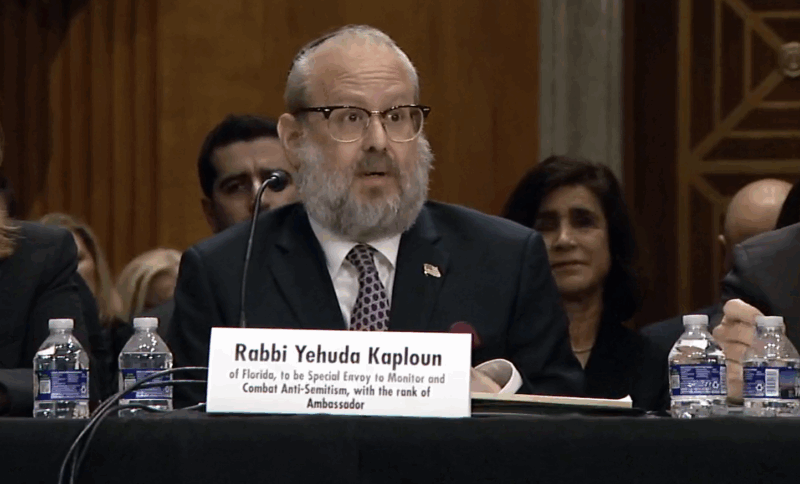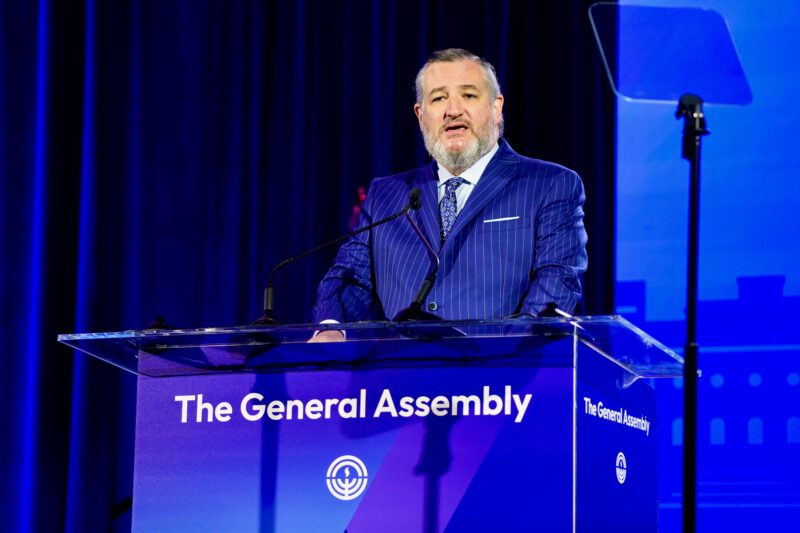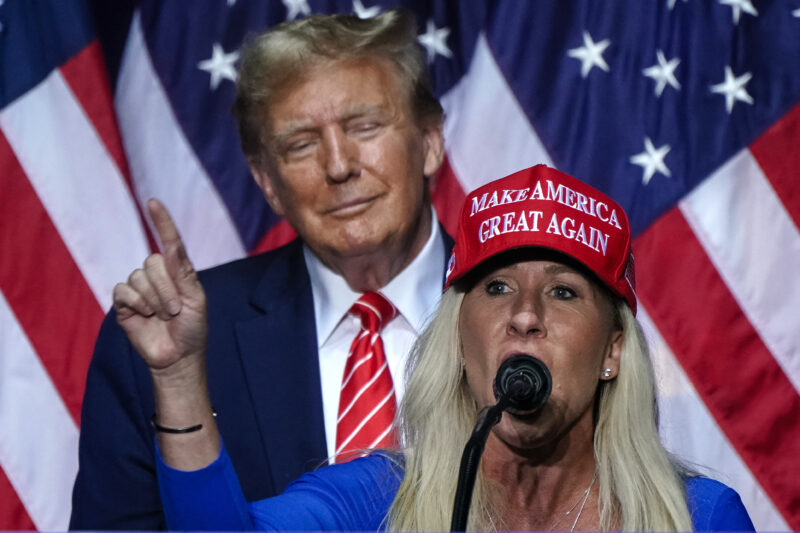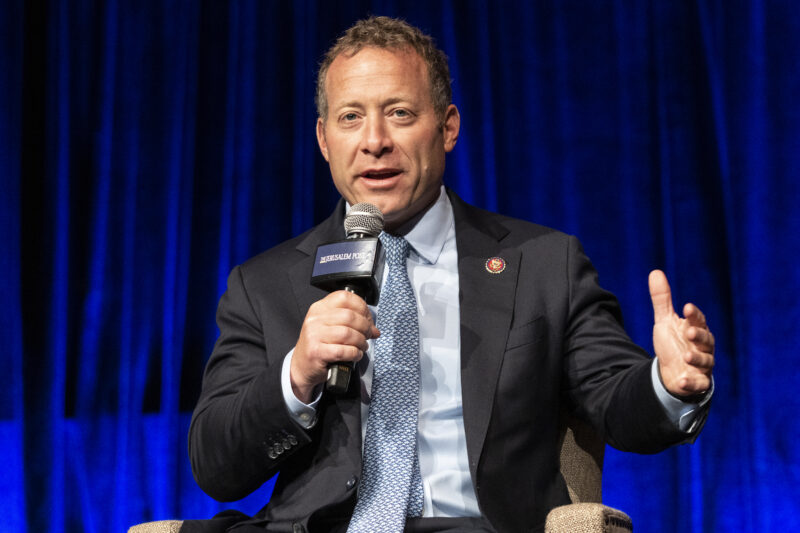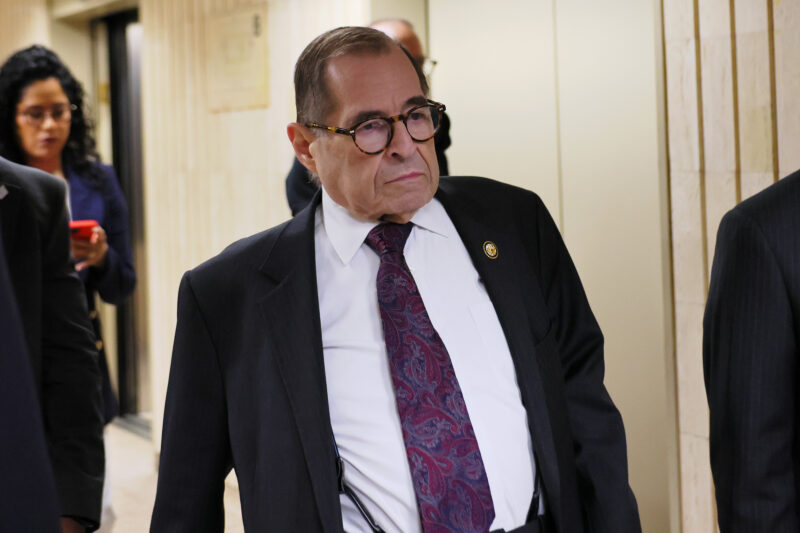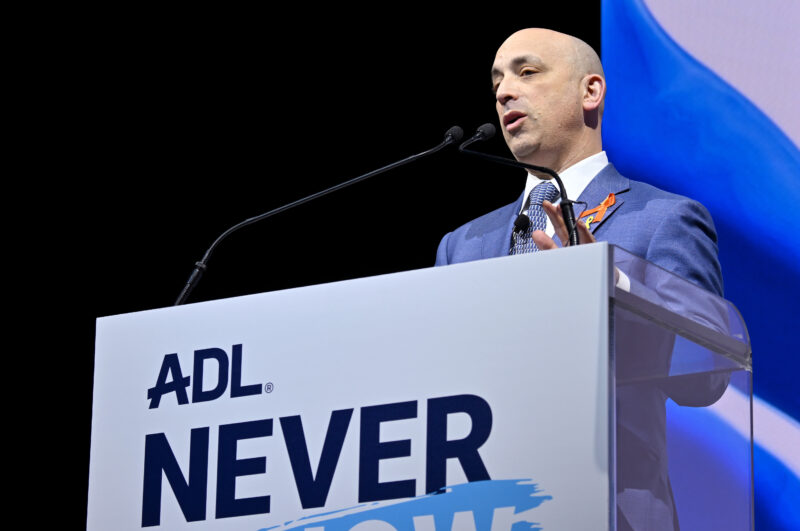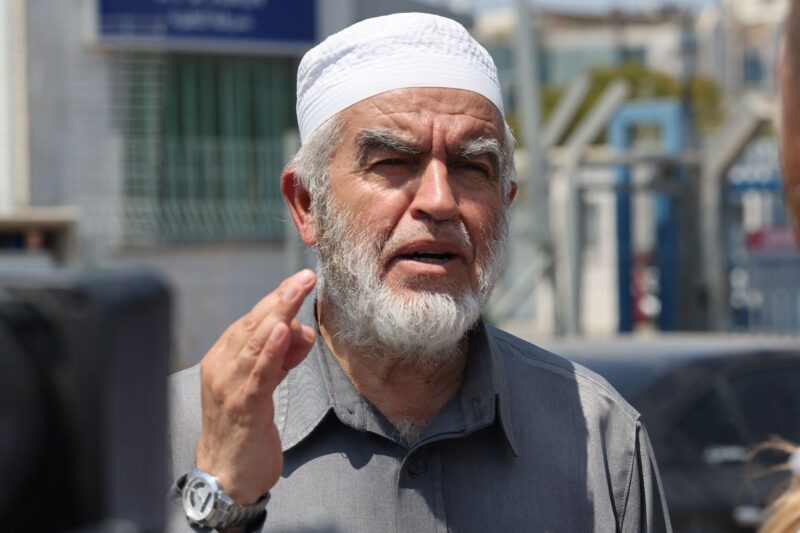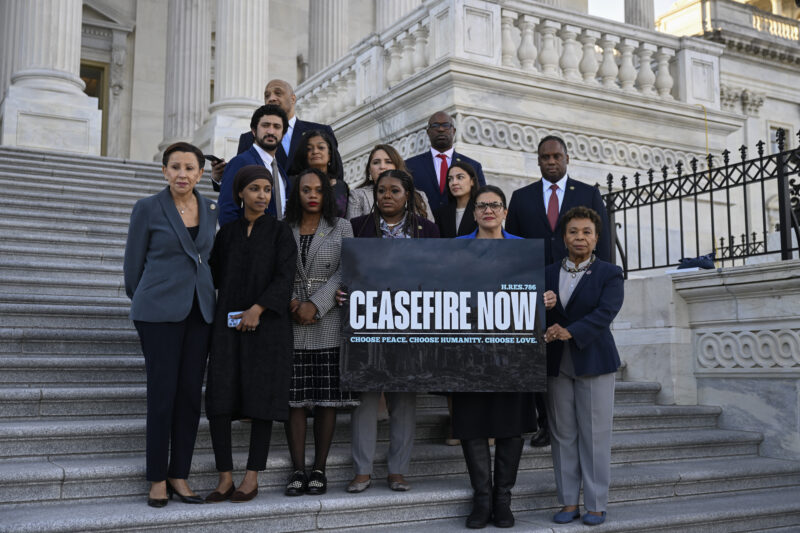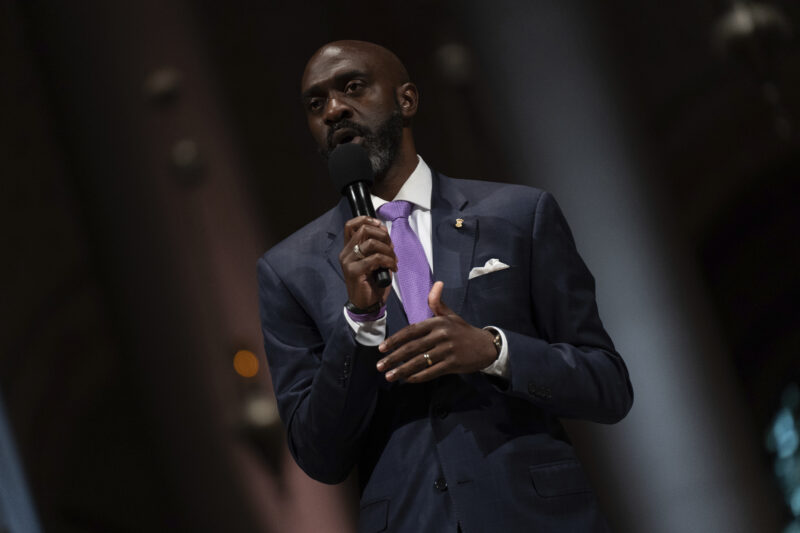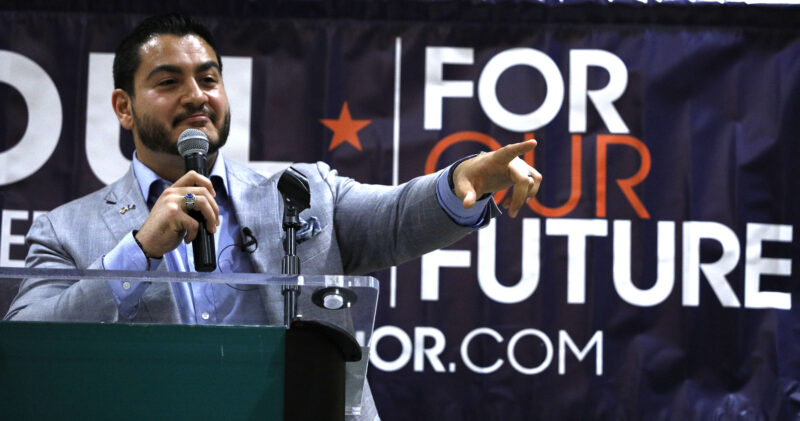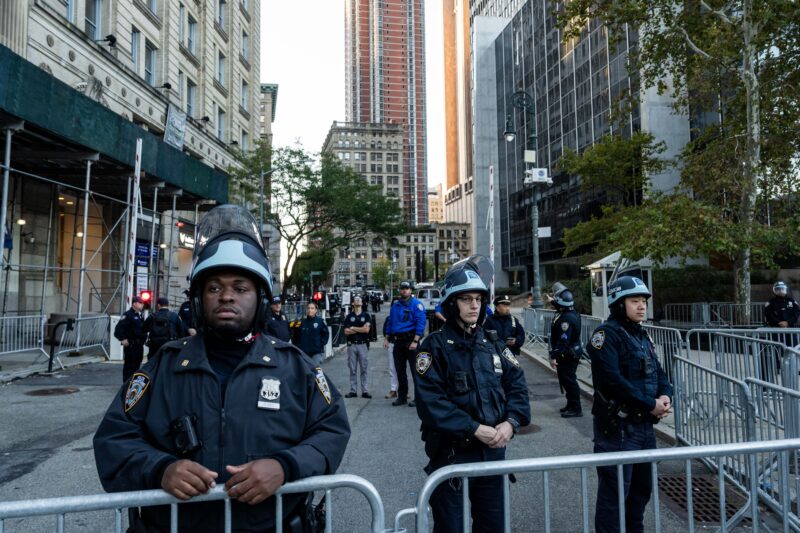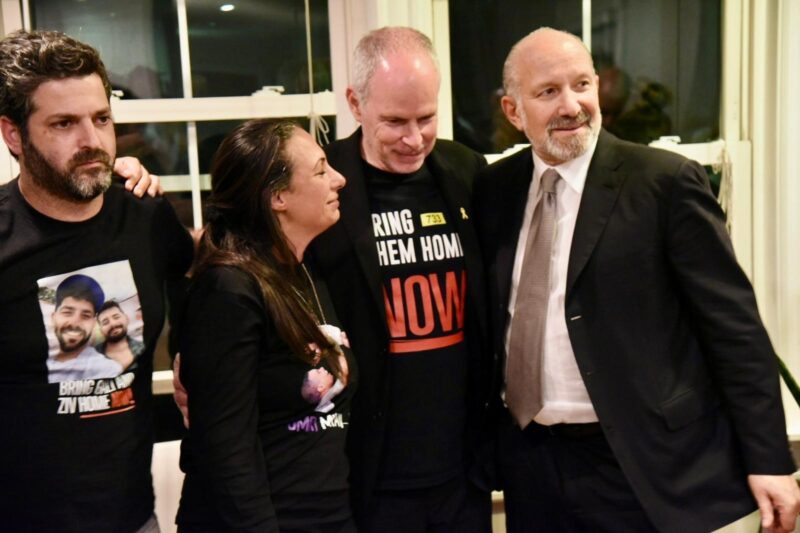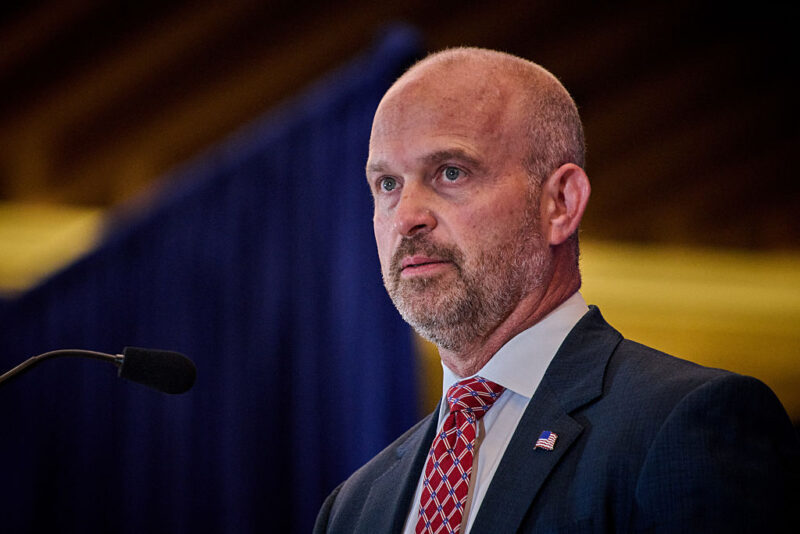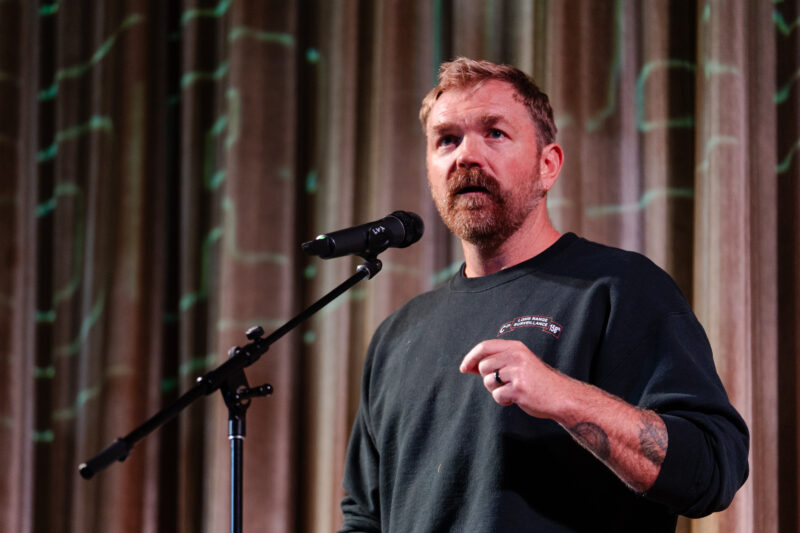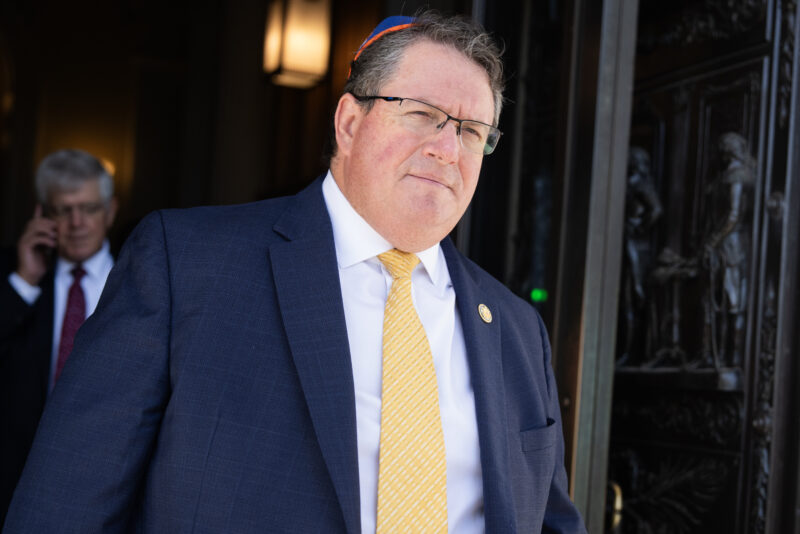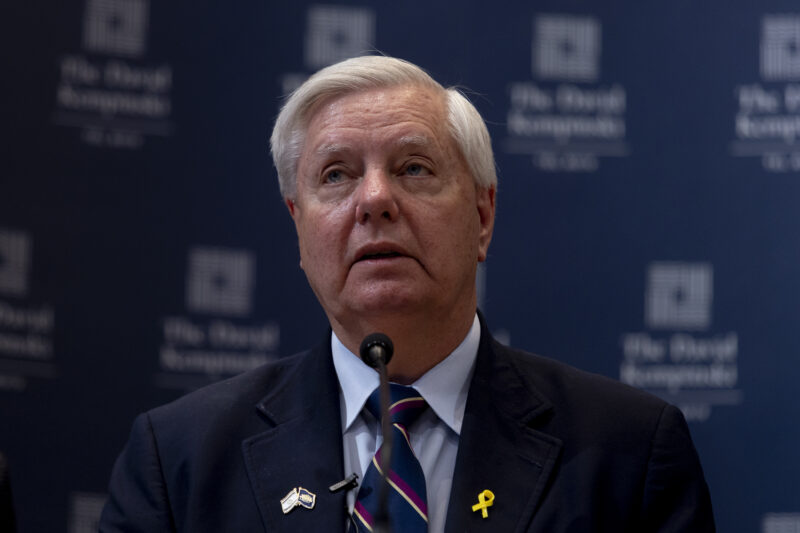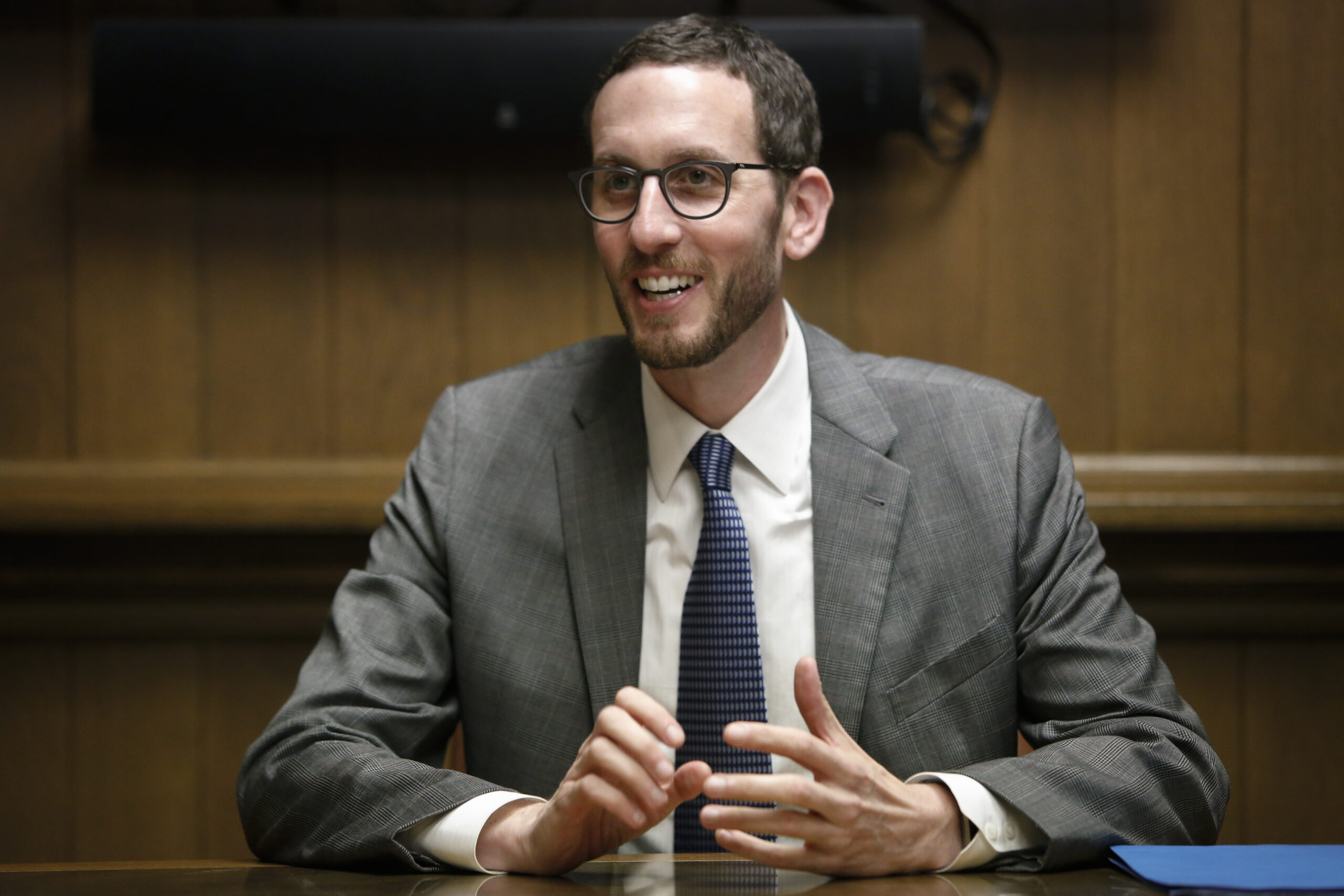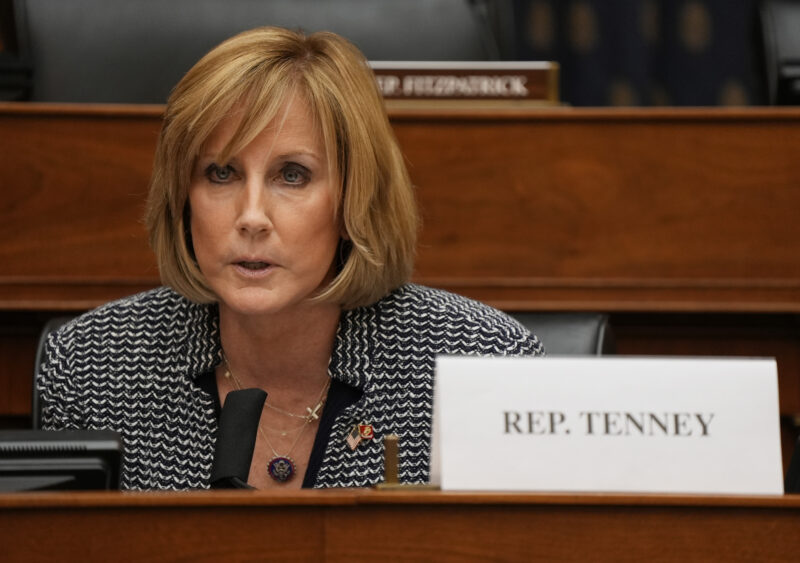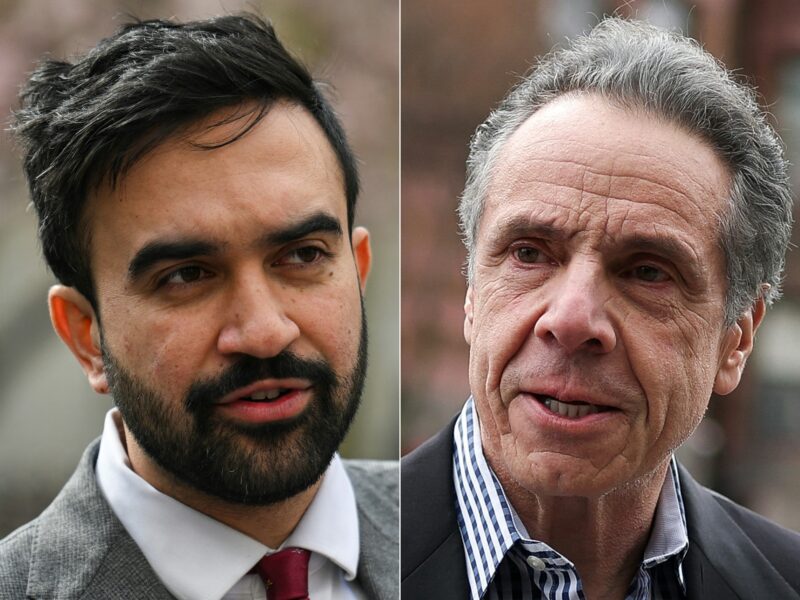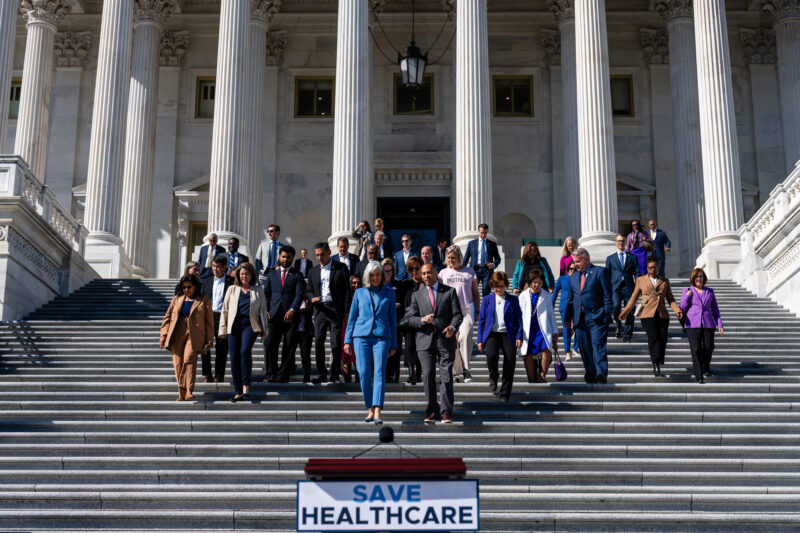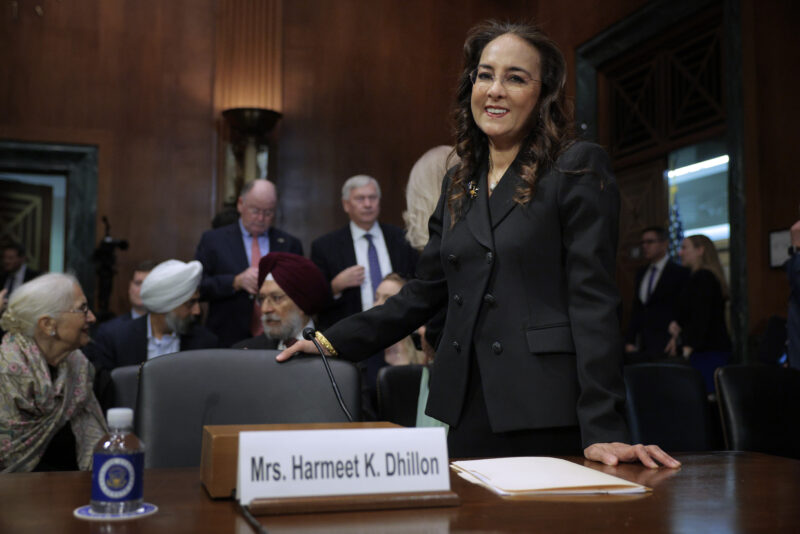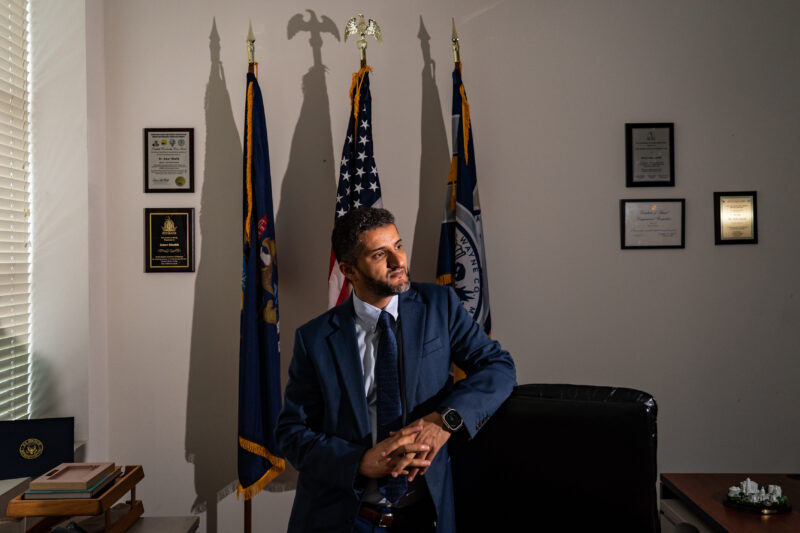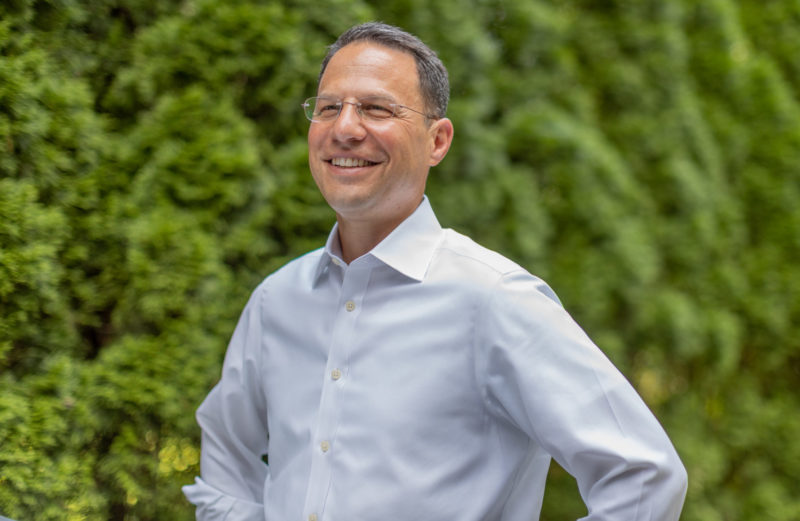The Antisemitism Awareness Act has been stalled in Congress despite its bipartisan support

Anna MoneymAaker/Getty Images/Tom Williams/CQ-Roll Call, Inc via Getty Images
Reps. Mike Lawler and Josh Gottheimer
Citing New York City Democratic mayoral nominee Zohran Mamdani’s stated plans to revoke the city’s use of the International Holocaust Remembrance Alliance’s working definition of antisemitism, Reps. Mike Lawler (R-NY) and Josh Gottheimer (D-NJ) called on Thursday for the House to pass the long-stalled Antisemitism Awareness Act.
The bill has seen no movement in the current congressional session in the House and faces significant hurdles in the Senate after a series of poison-pill amendments were added to the legislation. But Jewish groups are continuing to push for the bill’s passage, a top priority issue since Oct. 7, including in lobbying efforts this week.
“Zohran Mamdani’s reckless attempt to roll back New York City’s adoption of the International Holocaust Remembrance Alliance (IHRA) working definition of antisemitism is shameful, dangerous, and completely disgusting,” Lawler and Gottheimer said in a joint statement.
They went on to condemn as antisemitic the Boycott, Divestment and Sanctions movement, which Mamdani supports, “efforts to delegitimize Israel’s right to exist” and Mamdani’s refusal to “outright condemn the violent call to ‘globalize the intifada.’”
“Given the sharp spike in antisemitic violence, families across the Tri-State area should be alarmed. Leaders cannot equivocate when it comes to standing against antisemitism and the incitement of violence against Jews,” Lawler and Gottheimer said. “This is exactly why Congress must pass our bipartisan Antisemitism Awareness Act.”
The two vowed to “continue working together, across party lines, to make sure our communities are safe, our values are clear, and antisemitism is confronted head-on.”
In the House, the ADL’s agenda includes the stalled Antisemitism Awareness Act

Jemal Countess/Getty Images for Anti-Defamation League
Jonathan Greenblatt speaks onstage during the 2024 ADL “In Concert Against Hate” at the Kennedy Center Concert Hall on November 18, 2024 in Washington, DC.
Advocates with the Anti-Defamation League are set to lobby lawmakers this week on a series of actions related to antisemitism, including pushing to jump-start the stalled Antisemitism Awareness Act.
In connection with the start of the school year, the ADL is bringing a group of around 30 volunteers to the Hill, hailing from 13 states, for meetings with 11 Senate and 11 House offices, including seven Republicans and 15 Democrats, a spokesperson told Jewish Insider.
The group’s agenda for the House includes the Antisemitism Awareness Act, the top-priority legislation for major Jewish groups since the Oct. 7, 2023, Hamas attack on Israel, that failed to pass Congress in 2024 and has again stalled in 2025, after a contentious Senate committee markup earlier this year. The House has yet to take action on the bill.
“Antisemitism is showing up in classrooms, on campuses, and in the daily lives of Jewish students in ways we have not seen in generations,” Lauren Wolman, ADL’s senior director of government relations and strategy, told JI. “Our Back-to-School Lobby Day is about ensuring that Congress takes this threat seriously — not tomorrow, not next year, but now. Every student deserves to learn in a safe and inclusive environment, and that requires action.”
The ADL advocates are also set to lobby in support of the HEAL Act, which would order an audit of national Holocaust education programs; for “robust funding” for the Department of Education’s Office for Civil Rights, which House Republicans and the Trump administration have aimed to cut significantly; and for lawmakers to send letters to elementary and secondary schools in their districts, calling on the schools to implement clear policies on antisemitic harassment.
In the Senate, the advocates are set to push for the passage of the Protecting Students on Campus Act, which aims to make it easier for students to file discrimination claims, requires schools to report annually on instances of discrimination on campus and requires the Department of Education’s Inspector General to audit schools with high levels of discrimination complaints.
The Senate agenda does not include the Antisemitism Awareness Act, the passage of which in the upper chamber has been complicated by a series of poison-pill amendments added during the committee markup.
The version of the Antisemitism Awareness Act in the House remains unamended and could be passed with bipartisan support as-is, if brought to the floor, whereas additional procedural steps would be needed to bring forward a clean version of the bill in the Senate.
In meetings with Senate offices, the ADL activists are also set to support the HEAL Act, OCR funding and letters to local schools. The ADL will offer a letter template to lawmakers with recommendations including adopting a definition of antisemitism.
“Bringing together advocates from 13 states to meet with both Democrats and Republicans demonstrates the breadth of concern and the urgency of this issue,” Wolman continued. “From first-time volunteers to seasoned ADL leaders, our message is the same: protecting Jewish students is not partisan, it’s a matter of basic safety and civil rights.”
According to ADL data, there were more than 850 incidents of antisemitism at elementary and secondary schools in 2024, in addition to 1,700 incidents on campus. In total, the two categories account for nearly 30% of antisemitic incidents nationwide.
ADL CEO Jonathan Greenblatt: ‘I'd like to see the extremes marginalized so the vast majority of members of Congress on both sides can get the stuff done that needs to happen’

Marc Rod
Lawmakers gather on the Capitol steps on June 10, 2025 for a vigil for Yaron Lischinsky and Sarah Milgrim, Israeli Embassy staffers who were killed in an anti-Israel attack.
It’s been two months since the Capital Jewish Museum shooting in Washington and the Boulder, Colo. firebombing attack.
The two attacks prompted unified condemnation from lawmakers and calls from the Jewish community for Capitol Hill to take aggressive action against the escalating antisemitism crisis in the United States. But as Congress heads into its August break, that initial momentum has produced little concrete action.
The House and Senate have passed resolutions condemning the attacks, but key legislation related to antisemitism remains stalled, even as lawmakers individually and in groups continue to press for action.
There are still no clear prospects for passage of the Antisemitism Awareness Act, a key element of congressional efforts to address antisemitism, after a contentious Senate committee meeting in April in which Democrats, joined by Republicans including Sen. Rand Paul (R-KY), voted to add amendments that most Republicans supporting the bill view as nonstarters. House leaders have made no public moves to advance the legislation.
And despite calls from Jewish groups for significant increases in nonprofit security funding to as much as $1 billion next year and a push from a bipartisan coalition of lawmakers for $500 million, the funding levels under consideration in the House are so far little different from those discussed in prior years.
One Republican senator working on the Antisemitism Awareness Act told Jewish Insider they have not seen much movement among colleagues who have continued concerns about the legislation, in conversations with those colleagues and the White House.
The senator said they are frustrated by unresolved disputes about the International Holocaust Remembrance Alliance’s working definition of antisemitism on the Republican side of the aisle, noting as well that there are steps the administration can take independently.
Jonathan Greenblatt, the CEO of the Anti-Defamation League, said at a press conference last week that “there needs to be, for sure” more focus from Congress on tackling antisemitism. A key part of that, he said, will be sidelining extreme voices.
“I think too often extremes on both ends kind of warp the conversation and insist that the definition of antisemitism somehow needs to include things like the false charge of ‘the Jews murdered Jesus,’ or the claim that anti-Zionism is never antisemitism,” Greenblatt said, alluding to the objections from both sides of the aisle to the Antisemitism Awareness Act.
“All the Jews didn’t murder Jesus, and anti-Zionism is antisemitism. I think I’d like to see the extremes marginalized so the vast majority of members of Congress on both sides can get the stuff done that needs to happen once and for all,” he continued.
Several sources familiar with the situation said that the bill is “stuck,” for the moment. Senate Republicans could attempt to bring the bill to the floor and utilize procedural means to eliminate the poison-pill amendments added to the bill in the Senate Health, Education Labor and Pensions Committee, but that would require Democratic support and could rehash the same ugly debates seen in the HELP committee.
It could also be added to a must-pass legislative package — but that same plan failed last year.
A source who has advocated for the legislation said that the recently passed budget reconciliation package sapped attention for antisemitism legislation in recent months, but argued that passing the Antisemitism Awareness Act is critical because there are no realistic alternative proposals for tackling antisemitism on Congress’s agenda at this point.
The Senate has also been focused on confirming presidential appointees.
The source said that advocates for the bill need to find strategies to work around the obstacles to the legislation, “and that has not been easy,” but insisted that they and others are not giving up on the bill.
“There just hasn’t been a lot of legislation [moving] in general,” Nathan Diament, the executive director of public policy for the Orthodox Union, said — arguing that the slow progress is not unique to the Antisemitism Awareness Act or antisemitism generally.
Sen. Jacky Rosen’s (D-NV) office told JI that she is continuing to advocate for the Antisemitism Awareness Act, and is also looking at potential other legislation that could move forward on antisemitism. Rosen, the co-chair of the Senate antisemitism task force, is the lead Democratic sponsor of the Antisemitism Awareness Act.
Senate Republicans had vowed, coming into the majority, to pass the bill.
“Republican control of the Senate means that this institution will no longer turn a blind eye to the growing threat of antisemitism in our country or the numerous threats that our ally Israel faces on all sides,” Senate Majority Leader John Thune (R-SD) told JI after Republicans won the Senate majority. “We will empower committees to advance legislation addressing antisemitism and protecting students on campuses, and we will increase oversight into Iran’s malign actions.”
On the House side, Rep. Mike Lawler (R-NY) told JI last week that “we’re working on” the Antisemitism Awareness Act. Pressed on whether Congress is moving strongly enough to respond to antisemitic violence, Lawler said, “It continues to be a strong focus of mine and many of my colleagues, and we’re working through the legislation.”
House Speaker Mike Johnson (R-LA) did not respond to a request for comment.
Observers believe the House, which passed the bill last year only for it to fail to move forward in the Senate, is waiting on the Senate to move first this year and prove that it can pass the bill.
Another source argued that, given the action the administration has taken to address antisemitism on college campuses, the Antisemitism Awareness Act is “less necessary” in the near term.
On NSGP funding, the House Appropriations Committee approved a bill that would allocate $335 million for the program in 2026 — the same funding level that the House backed for the program in 2025, though final funding levels ultimately fell short of that mark.
The Senate Appropriations Committee, meanwhile, has yet to finalize its homeland security funding bill. Sen. Chris Murphy (D-CT), the ranking member of the subcommittee responsible for such funding, told JI last week that lawmakers are “still negotiating” it.
Congress will have just a month to finalize government funding or pass a stopgap bill when it returns from August recess.
A Republican senator working on the issue said they’ve been focusing on ensuring that outstanding NSGP funding for this year is disbursed from the administration before turning to the appropriations process for next year.
“First things first on it, let’s get the grant money out so people can actually create a more secure environment where they’re physically located,” the senator said. The administration opened applications for the 2025 grant program on Monday, but some supplemental funding remains to be allocated.
Diament said that Congress is in the “fourth or fifth inning out of nine” on government funding, and that the process will likely play out mostly in September or October. He also argued that, given the “tight fiscal environment,” particularly for homeland security funding, the fact that advocates were able to secure a $30 million increase in NSGP funding from the initial proposed level of $305 million, on a bipartisan basis in the House Appropriations Committee is very “valuable in the process going forward.”
In “the later innings of the process, it laid very good groundwork” for further bipartisan movement to increase funding as the process proceeds, Diament continued. “We made sure to work it on a bipartisan basis and we’re moving in the right direction.”
“Given everything else on the legislative calendar and where we are on the legislative calendar, I don’t feel like we’re behind,” he continued.
Rep. Don Bacon (R-NE), a co-chair of the House antisemitism task force, asked about congressional action on antisemitism last week, said that “there’s a place for legislation” but argued that other steps are also needed to make antisemitism unacceptable in public discourse.
“In the end, Americans have to speak out on this,” Bacon said at a press conference on legislation aiming to tackle support for terrorism on social media. “We have to make it like it’s embarrassing to be standing on that side saying those things. So we got to speak up. And you can’t legislate that.”
Several Democrats said last week that more needs to be done legislatively to tackle antisemitism.
“We’ve had an unlimited amount of hearings, and the speaker has now come out with a security plan [for members] for the summer, and a lot of that, obviously, is tied to the amount of hate and threats that we are getting, but we still haven’t passed the Antisemitism Awareness Act,” Rep. Jared Moskowitz (D-FL) said. “No, we’re not doing enough to combat antisemitism and other forms right now of hate and demagoguery that’s going on.”
“The language and the culture, it’s just completely toxic,” Moskowitz continued, adding that Congress is “also not doing enough on the security grants. … They gave ICE $140 billion. We’re trying to get more money for security when the community is in grave danger, and these threats are out of control, at all-time levels.”
Sen. Richard Blumenthal (D-CT) said that “there can never be too much focus on antisemitism, and I see, frankly, too little right now, in light of events that are unfolding around the country.”
“I wish there were more focus on bias and bigotry of all forms, because it is growing, and so is violent extremism and the confluence of the two make for a very dangerous recipe for potential disaster,” Blumenthal continued.
Rep. Brad Schneider (D-IL), a co-chair of the House Jewish Caucus, said that “it’s not business as usual” on antisemitism, and that lawmakers are “working on it and we’re trying to take constructive steps.”
But he added that “we have to do more. We’re seeing antisemitism rising all across the country, being normalized in ways that should never be normalized” on both sides of the political spectrum.
Schneider said that “it is critical that everybody, Democrats, Republicans, House, Senate, stand together, stand united against anti semitism and not what about ism in here, we need to stand against hate. But antisemitism is rising at a rate that should give everyone concern.”
He primarily blamed Republicans for the lack of progress on legislation like the Antisemitism Awareness Act.
Jewish Insider’s congressional correspondent Emily Jacobs contributed reporting.
Their statement, calling for progress on the Antisemitism Awareness Act and increased security grant funding, comes ahead of two antisemitism votes in the House

Kevin Carter/Getty Images
The U.S. Capitol Building is seen at sunset on May 31, 2025 in Washington, DC.
A group of eight Jewish House Democrats called for action to advance the Antisemitism Awareness Act and increase Nonprofit Security Grant Program funding, in advance of votes on the House floor on a pair of resolutions condemning recent antisemitic attacks.
The statement highlights the recent string of antisemitic violence across the country and argues, “The Jewish community needs real action, not just resolutions.”
The lawmakers said that, “While the House will vote on two non-binding resolutions this week condemning the antisemitic attacks in Washington D.C., and Boulder, Colorado, the Jewish community is reeling, and we need Congressional leaders to come together and support real policy change.”
The statement was signed by Reps. Brad Sherman (D-CA), Josh Gottheimer (D-NJ), Jared Moskowitz (D-FL), Kim Schrier (D-WA), Debbie Wasserman Schultz (D-FL), Greg Landsman (D-OH), Brad Schneider (D-IL) and Lois Frankel (D-FL).
“In just the last two weeks, our country has witnessed two back-to-back antisemitic terror attacks that have left two dead and 15 seriously wounded,” the lawmakers said. “These events are an escalation of ongoing antisemitic violence that has become more and more common since Hamas’s October 7th massacre.”
The statement calls on Senate Majority Leader John Thune (R-SD) to bring a clean, unamended version of the Antisemitism Awareness Act to the Senate floor and for House Speaker Mike Johnson (R-LA) to bring the bill up for a vote in the House.
“Codifying the International Holocaust Remembrance Alliance (IHRA) definition of antisemitism is long overdue, and is more urgent now than ever as we see one violent anti-Zionist terror attack after another,” the statement reads. “You cannot fight antisemitism if you are unwilling to define it.”
It also calls for President Donald Trump and members of the Appropriations Committees to provide “long-requested levels of $500 million” for the NSGP, arguing, “it will help [Jewish institutions] put in place additional security measures like security cameras, locked doors, security guards, and more that could thwart terror attacks like the one that transpired at the Capital Jewish Museum.”
The statement outlines a series of violent antisemitic incidents in the past year and a half, including the Capital Jewish Museum murders and the Boulder, Colo., attack, as well as the attempted arson of Pennsylvania Gov. Josh Shapiro’s home during Passover; the death of Paul Kessler, who was killed in November 2023 in Los Angeles by an anti-Israel demonstrator who hit him on the head; and the stabbing of a Jewish barber in Yonkers, N.Y. in August 2024, which the lawmakers say “underlie the need for urgent, serious action.”
The statement’s neutral tone on the two antisemitism resolutions reflects the fact that many House Democrats are condemning one of the resolutions, led by Republicans, which focuses heavily on immigration issues. Controversial language describing “Free Palestine” as an antisemitic slogan was pulled from the resolution ahead of the vote.
House Minority Leader Hakeem Jeffries (D-NY) said Monday that the resolution is a “desperate attempt to distract,” an “embarassment” and a “joke.”
The statement was also endorsed by Democratic Majority for Israel.
Schumer didn’t directly address a conversation he'd had with Rep. Josh Gottheimer, who said the Senate majority leader committed to a vote before the end of the year

Kevin Dietsch/Getty Images
Sen. Charles Schumer (D-NY) leaves a Senate briefing on February 15, 2023.
Senate Majority Leader Chuck Schumer (D-NY) told Jewish Insider on Wednesday that “[w]e’re trying to figure out the best path forward” on the Antisemitism Awareness Act, after a House lawmaker said the Senate leader had committed to holding a vote.
The legislation passed the House with strong bipartisan support but has been stalled in the Senate for months amid opposition on both sides of the aisle.
But Rep. Josh Gottheimer (D-NJ) said he’d spoken to Schumer recently and Schumer had committed to holding a vote on the bill before the end of the year. Asked about that conversation in a brief interview with JI, Schumer didn’t provide details on his plans or current discussions or directly address his reported commitment to Gottheimer.
The bill has been filed as an amendment to the National Defense Authorization Act. Schumer has been facing increasing Jewish community pressure to call a vote on the bill.
The Massachusetts Democrat said he’ll walk out of Netanyahu’s congressional speech if he attacks Biden, and discussed his concerns about the Antisemitism Awareness Act

Courtesy
Rep. Jake Auchincloss (D-MA)
Rep. Jake Auchincloss (D-MA), closing out his second term on Capitol Hill, has emerged as a prominent, pragmatic voice among younger members of the Democratic caucus, and is seen as a potential leader on key issues.
Jewish Insider’s Editor-in-Chief Josh Kraushaar and senior congressional correspondent Marc Rod sat down with Auchincloss, who is Jewish, for nearly an hour in his Capitol Hill office last week to discuss the state of the Democratic Party, the situation in the Middle East, antisemitism, Israeli Prime Minister Benjamin Netanyahu’s upcoming address to Congress — and more.
This interview has been edited for length and clarity.
Jewish Insider: What [lessons] do you read from that pretty decisive victory from George Latimer [over Rep. Jamaal Bowman] in New York?
Auchincloss: I would caution any pundit from extrapolating from that race to broader dynamics. There was a lot going in there that is idiosyncratic to that district. There is Jamaal’s break with the president on [the] bipartisan infrastructure [bill]. There’s obviously some of his own unforced errors in regards to both constituent communications and engagement, and also actions here on the Hill. It’s got a big Jewish community there, very engaged Jewish community. You’ve got Oct. 7 as a catalyzing agent, a challenger who is already very well-vested in the community. I know it’s an attractive proposition to take a single primary with — how many people voted, like 30,000? — I would caution against extrapolation.
JI: It seems like rock-solid support for Israel is at a low point in the Democratic Party, at least in [the time you’ve been on the Hill]. Is it possible to get back, in the Democratic Party, to the pre-Oct. 7 point and what would have to happen to make that happen?
JA: Joe Biden, Chuck Schumer, Hakeem Jeffries, the three most prominent Democrats on Capitol Hill, in Washington — strongly pro-Israel. The Democratic Party remains a pro-Israel party.
We have an under-30 problem, for sure. So I worry more about Congress 20 years from now than I do Congress today — you saw the vote tally for Israel … But I do worry about the next generation, and that is going to require addressing not just Gaza, but also the West Bank. And in some ways, the West Bank is going to be equally as important as Gaza, because much of Netanyahu’s strategy over the last decade was about destabilizing both … The Israelis need to stop with expansion of settlement activity … In terms of antisemitism, as I’ve said before, the Democratic Party can’t have double standards on antisemitism, and we should look at the Labour Party in Great Britain as a warning.
JI: Is the [Democratic] party headed in that direction?
JA: No, the mainstream of the party is not. And yet, I will say that your values are communicated by the fights that you’re willing to pick … Just because the mainstream of the Democratic Party, I believe, solidly understands and opposes antisemitism, does not mean that that value gets communicated effectively if we do not condemn, name, shame antisemitic elements, and that includes what’s happening on college campuses.
JI: Rashida Tlaib spoke at a conference where there was promotion of terrorism, PFLP affiliates in Michigan. Very few Democrats — a couple spoke out — but very few wanted to comment, that we talked to. Do Democrats need to speak out when there are these episodes within the party?
JA: It’s unacceptable, yes. And I think we also, though, have to be cautious that we are not injecting oxygen in a way that takes a spark and makes it into a fire, right?… Some things we’re going to say, ‘Hey, this is best just marginalized by silence.’ But I think other things, like when individuals are claiming that allegations of rape or sexual violence after Oct. 7 are propaganda — that’s unacceptable, that needs to be said.
JI: What are you looking at and thinking about ahead of [Israeli Prime Minister Benjamin Netanyahu’s] congressional speech? What are you hoping to hear from him? What are you afraid that [he’ll say]?
JA: What I’m hoping is that he’s going to tell us he’s going to call elections. That’s what I’m hoping for … What I want to hear is a concrete proposal for day-of governance to defeat Hamas. The president’s 10 points that he put forward a month ago, month and a half ago — [including bringing the] hostages home [and the] permanent defeat of Hamas — those two remain the objectives, and I think the prime minister needs to articulate how he does that and and not do hand-waving of ‘Military now, governance later.’ It’s got to be how we’re going to do military and governance intertwined.
JI: What is your sense of how [Netanyahu’s speech is] going to play on Capitol Hill, and could this hurt the cause of support for Israel, within your party especially?
JA: It’s up to how the prime minister addresses Congress. If it’s a repeat of 2015, yeah, it’s going to hurt. I’m attending out of respect for the U.S.-Israel relationship, which I think is critical … but if the prime minister criticizes Joe Biden directly, I’m walking out of that speech … and I would encourage Democrats broadly to make that our approach.
JI: Hamas has repeatedly turned down this [cease-fire] deal, has repeatedly shifted the goalposts … If there isn’t a deal that is achievable here, what does the path forward look like? Do you think that the administration should be supporting Israel continuing its military operations, at that point, until it feels that it’s done? Or do you think that there needs to be sort of a movement by Israel to unilaterally start winding things down at this point, regardless?
JA: I’m not sure it’s a binary like that. Actually, I would argue that they have to be synthesized. My criticism of Netanyahu has never been that he argues that military force is necessary in Israel. I have, to date, still not said that there should be a permanent cease-fire there, because I continue to believe that Israel needs to use military force to degrade Hamas’ capabilities, to control the security perimeter around Gaza, to put pressure on Hamas to negotiate, right? So I think all those things are true.
My criticism of Netanyahu has always been that he has not twinned that military pressure with a governance strategy. And people call it, oftentimes, the day-after approach. I actually reject that term because it implies a sequentiality that I don’t think exists. It is parallel. It is day-of. You’ve got to be attacking Hamas and, same day, in north, central, even south Gaza, empowering elements of — and it will be probably the Palestinian Authority — to provide security, economic development, infrastructure maintenance.
JI: Do you think Hamas can be, in the language of Netanyahu, defeated in Gaza?
JA: Yes, is the short answer. People like to say, ‘Oh, you can’t defeat an ideology,’ as though we should just all just throw up our hands and be like, ‘Yeah, you’re right. Hamas should just get to do whatever they want.’ No, we can. We can defeat Hamas. Does that mean that there is no human being in Gaza who subscribes to Islamist terrorism? No, of course, not … If you go back to the classic definition of a state as having a monopoly on the organized use of violence and depriving Hamas of the levers of statehood, of having a monopoly on the organized use of violence, 100% we can defeat Hamas. We will not defeat Hamas purely with [bullets] or [bombs]. We will defeat Hamas because there will be an alternative that the people of Gaza find more compelling.
Part of defeating them is also looking at the education system in Gaza, [which] I think is really critical. People are looking for this easy, knee-jerk bow tie: ‘Oh we’re going to recognize Palestinian statehood, be able to walk away and we’ve done it.’ I think it’s a lot harder. It’s incremental gains in security, infrastructure, economic development, education that just increase standards of living for Palestinians so that they are not being educated into or subscribe to a death cult’s ideology.
JI: This Saudi deal that’s being talked about, they’re apparently asking a lot of the U.S.: more advanced weapons, defense guarantees, domestic nuclear enrichment. Are those things that you’d be amenable to the U.S. providing, if it [helps achieve] regional normalization?
JA: I strongly support the Abraham Accords. I strongly support, obviously, Saudi recognition of Israel and Saudi entrance into the Abraham Accords. I am deeply skeptical of a defense guarantee [from] the United States for Saudi Arabia. I understand what Saudi Arabia gets out of that. I’m not totally sure [what] we get out of that, what Israel gets out of that … I would want to see, also, significant capital, both financial and political, from the Saudis for Gaza as well. The Arab states have done nothing for the Palestinian people for a century. It’s time for that to change, and that needs to be part of a deal.
JI: How are you looking at Qatar right now?
JA: A necessary evil. They’re the interlocutor, obviously, between us and Hamas. I’m not, obviously, in the conversations about the exact ways to calibrate pressure on Hamas’ political arm in Qatar; I agree that we should put more pressure on them, to the extent that we can, to accept the deal, the temporary cease-fire. I also understand that if you do it too much, and they end up in the Sahel [in Northern Africa], and we lose all contact with the political wing of Hamas, we don’t have an interlocutor. I’m not sure that serves the purposes of the hostages, either.
JI: The foreign funding from Qatar has been reported as sort of a leading driver for some of the problems of antisemitism on campus? Is there anything legislatively that can be done to address foreign interference or foreign money going into universities?
JA: I think that needs to be explored as part of the tax deal [in the] next Congress about tax treatment for universities that take significant amounts of or have significant connections to Islamist ideology.
JI: On the taxes issue — does the administration need to start really putting teeth into these investigations and start threatening or actually taking away tax-exempt status and federal funding from these schools?
JA: Obviously there’s a range of repercussions available as part of OCR investigations. Today, I couldn’t point to an example where I say, ‘Oh, the administration should have been tougher in this sense.’ And so I am reluctant to say that. I will say, as part of the tax deal, that needs to be part of the conversation … We benefit from immigration, we benefit from the fact that other countries want to invest in and send their students to our universities. I’m very liberal on this concept. We also have to recognize that in this there are a couple of bugs in that operating system, and one of them is that, in the same way that Saudi and Qatar are trying to launder their money through golf or through other outfits, they’re trying to do it through education as well, and we do have to be cognizant of that. The same way that I was a co-lead of the TikTok bill we can’t allow the next generation of Americans to be inculcated in a fundamentally anti-American ideology.
JI: You’ve got a lot of colleges and universities [near] your district … What do they need to be doing over the summer, proactively to prepare for [the fall semester] and to, you know, have better responses ready to go in the fall [to antisemitic activity]?
JA: At a high level, enforce their own rules and boundaries. And this was one of the reasons I voted against the Antisemitism Awareness Act. These colleges already have time, place and manner restrictions. They already have Title VI compliance rules that they just under-enforced or downright ignored. I talked about this with … a president of a prominent university who has done a good job. I was like, ‘What’s your secret?’ And he was like, ‘I just enforced what the rules are.’
JI: Your vote against the [Antisemitism Awareness Act] stood out — tell us a little bit about your thinking on that front?
Auchincloss: It opens a constitutional can of worms. It codifies cancel culture on campus. And I’m opposed to cancel culture. And it solves no problem … We don’t need to update congressional statute. We need these faculty and university leadership to enforce their own time, place and manner restrictions, and then we need to fund OCR at the Department of Education to prosecute universities that are failing…
I saw the potential downside of it being misappropriated to chill speech. And you can see that happening. No other protected class has a single and solitary definition … I think that facts and context and evolving societal understanding should matter in this … What we need these universities to be is ‘small l’ liberal. The Jews have thrived in liberal, open, meritocratic environments. What we do not want to do is double down on, I think, is identitarian politics. I do not think that in the long run, that is going to serve the Jewish people.
JI: That loops into this debate that is happening in the Jewish community about [Diversity, Equity and Inclusion programs], which is, do DEI programs need to be expanded to better include Jews, or should they be dismantled because they’ve been shown to have, it seems like, ingrained bias or failure to recognize the situation of Jewish people?
JA: I prefer the word pluralism, because it’s really what we’re talking about — at least how I interpret the intentions behind DEI. Pluralism is a very old American idea. If you read the 2018 Harvard statement on inclusion and belonging that [Harvard political science professor] Danielle Allen wrote — that version of I think she called it pluralism, but probably today would be called DEI — that version, to me, is conducive to a suitable learning environment.
JI: We saw in New York that the people who occupied Hamilton Hall [at Columbia University] were not charged, most of them at least, at the White House vandalizing statues — I don’t think any of them have been charged. Are you concerned about that?
JA: More broadly about property and violent crime being under-enforced — I’ve always been opposed to that. I disagreed with the decision by a previous Boston [district attorney] to blanket take 20 property crimes and say she proactively was not going to prosecute … I’m a law-and-order liberal. I believe that we should be prosecuting property and violent crime assertively, including this.
Supporters of the bill allege Schumer is now slow-walking a floor vote because he is fearful that it will highlight divisions within his caucus

Kevin Dietsch/Getty Images
Senate Majority Leader Chuck Schumer (D-NY) speaks after the Senate passed a foreign aid bill at the U.S. Capitol on April 23, 2024, in Washington, D.C.
Senate Majority Leader Chuck Schumer (D-NY) is facing mounting pressure from Jewish leaders and Democratic colleagues who have privately voiced frustrations with the continued delay in moving to advance a major bill aimed at addressing a recent surge in antisemitic activity on college campuses.
Schumer, who has been outspoken against rising antisemitism in the wake of Hamas’ Oct. 7 attack, had endorsed prior versions of the legislation, called the Antisemitism Awareness Act, which first passed the Senate in 2016 under unanimous consent.
But after an initial effort to unanimously fast-track the bill failed last month in the Senate, Schumer has since delayed for weeks in bringing the bill up for a floor vote, even as it is expected to pass comfortably with bipartisan support and has won backing from a large number of Jewish groups.
In a brief interview with Jewish Insider on Thursday afternoon, Schumer, who has rarely addressed the matter publicly, stressed that he is now “looking at every single option to try and get strong, bipartisan legislation passed,” but he did not share a timeline for approving the bill.
“The crusade against antisemitism is in my bones, has been for my whole life,” he said, describing “the goals and aspirations of” the bill as “so important in this fight and to the future.”
Still, the holdup has angered supporters of the bill who allege that Schumer — the highest-ranking Jewish elected official in the country — is now slow-walking a floor vote because he is fearful that it will highlight divisions within his caucus while garnering a larger share of Republican backers.
“He is avoiding this at all costs,” said a person familiar with the matter who spoke with JI on the condition of anonymity to address a sensitive topic. “The reason why he hates this is because Schumer knows there’s going to be 40 to 45 Republicans who are going to vote for this bill, but there’s only going to be 30 Democrats.”
The bill would enshrine a definition of antisemitism used by the International Holocaust Remembrance Alliance into federal law and direct the Department of Education to consider the definition — which, among other things, identifies some criticism of Israel as antisemitic — in evaluating complaints of anti-Jewish discrimination on college campuses. That policy has been in place since 2019 under an executive order signed by former President Donald Trump.
While the legislation passed the House early last month by a wide margin, it has also drawn opposition from members of both parties, including some progressive and right-wing critics who have raised varying objections to the bill on free speech grounds.
Despite some resistance to the bill in the Senate, however, two of the most vulnerable Democrats up for reelection in November — Sens. Bob Casey (D-PA) and Jacky Rosen (D-NV) — are each eager for Schumer to call a vote and are urging him to act, according to sources familiar with their outreach.
A Senate aide confirmed to JI on Tuesday that Casey, who reintroduced the legislation with Sen. Tim Scott (R-SC) in April, is pushing Schumer to move forward.
“At a time when antisemitism has skyrocketed across the United States in the aftermath of the October 7 terrorist attack in Israel, particularly on college campuses, I’ve been working with Senator Schumer to advance the bipartisan Antisemitism Awareness Act,” Jacky Rosen (D-NV) said, adding that the majority leader “is looking at every path forward to get this done.”
“The horrific rise in reported incidents of antisemitism is a clarion call for Congress to step up and protect students on campuses across the nation,” Casey said in a statement shared with JI on Thursday. “The need for my Antisemitism Awareness Act has never been greater and I am working with Leader Schumer on all legislative options to pass it as quickly as possible.”
For her part, Rosen, a Jewish Democrat who is the lead sponsor of a separate antisemitism bill that also remains stalled in the Senate, has grown especially frustrated with Schumer’s delay as the summer congressional recess draws closer, said one well-placed source familiar with her thinking.
In a statement to JI, however, Rosen expressed confidence in Schumer’s approach to the bill, which she called “an important step in addressing rising campus antisemitism.”
“At a time when antisemitism has skyrocketed across the United States in the aftermath of the October 7 terrorist attack in Israel, particularly on college campuses, I’ve been working with Senator Schumer to advance the bipartisan Antisemitism Awareness Act,” she said, adding that the majority leader “is looking at every path forward to get this done.”
Meanwhile, several Jewish leaders who met with Schumer last month to lobby on behalf of the bill indicated in a follow-up letter sent to his office last Friday that their patience has been wearing thin.
In the letter, obtained by JI and written by top officials at a range of major Jewish and pro-Israel groups, the Jewish leaders requested an update from Schumer and “once again” exhorted him to greenlight a vote, emphasizing that in their initial meeting he had “committed to us that there would be movement on the bill within a short timeframe.”
Describing the legislation as “a high priority of the American Jewish community,” the Jewish leaders called on Schumer to move with alacrity before the fall semester begins on campuses, citing “a dramatic increase of antisemitic activity” on college campuses amid the ongoing Israel-Hamas war.
“We must ensure that, when students arrive on campus in the fall, we have adequately equipped the agencies tasked with protecting their civil rights,” the signatories elaborated in their letter to Schumer. “The Antisemitism Awareness Act is a key piece of this effort. In light of this unfolding crisis, we urge you to bring the bill to the Senate floor prior to the beginning of the 2024-25 academic year.”
The letter was signed by William Daroff of the Conference of Presidents of Major American Jewish Organizations; Ted Deutch of the American Jewish Committee; Eric Fingerhut of the Jewish Federations of North America; Jonathan Greenblatt of the Anti-Defamation League; Howard Kohr of AIPAC; Eric Goldstein of UJA-Federation of New York; and Nathan Diament, executive director of public policy for the Orthodox Union.
A source familiar with the situation previously told JI that, during the meeting with Jewish leaders, Schumer had indicated that he is still trying to resolve objections to the bill, which is likely to be a difficult prospect given entrenched opposition from some lawmakers on both sides of the aisle who say the legislation limits free speech. The Jewish leaders urged Schumer to bring the bill to a vote.
In comments to JI on Thursday, representatives of some of the Jewish groups that met with Schumer reiterated their support for the bill. “We are eager for the AAA to be voted on by the Senate,” Diament said in a statement, using an acronym for the bill. “It passed the House by an overwhelming margin and we are confident the same will happen in the Senate when brought for a vote.”
Karen Paikin Barall, vice president of government relations at JFNA, echoed that view, calling the Antisemitism Awareness Act “a critical piece of legislation” and voicing “hope it will come to a vote in the Senate as soon as possible. We are confident that it will pass.”
Sheila Katz, the CEO of the National Council of Jewish Women, who attended the meeting with Schumer last month, said in an interview with JI that “passing legislation to combat antisemitism is a top priority” for the Senate leader. “Once again,” she said, “he has mobilized to ensure critical legislation to combat antisemitism moves forward. He is doing this in a thoughtful and strategic way by actively working with multiple stakeholders and Jewish organizations.”
The ADL has been “working closely with” Schumer and his team, said Dan Granot, the group’s director of government relations, “and as we have discussed multiple times, now is the time for Congress to step up and meet this moment of rising antisemitism.”
Julie Fishman Rayman, the managing director of policy and political affairs at the AJC, called Schumer “a committed ally of the American Jewish community” and said he “knows that it is in the best interest of the community to get a bill that defines and counters antisemitism passed by the Senate before the end of this congressional session.”
On Thursday, some Jewish leaders also came to his defense.
Sheila Katz, the CEO of the National Council of Jewish Women, who attended the meeting with Schumer last month, said in an interview with JI that “passing legislation to combat antisemitism is a top priority” for the Senate leader. “Once again,” she said, “he has mobilized to ensure critical legislation to combat antisemitism moves forward. He is doing this in a thoughtful and strategic way by actively working with multiple stakeholders and Jewish organizations.”
But while NCJW supports the IHRA definition as “an educational tool,” as the group states on its website, it does “not recommend this be codified into law or used to prohibit freedom of speech in any way.” Katz clarified to JI that NCJW “has been focused on advocating for” another bill that Schumer has co-sponsored called the Countering Antisemitism Act, which was introduced in April by Rosen and Sen. James Lankford (R-OK), but noted that “we do not oppose the AAA.”
Amy Spitalnick, the CEO of the Jewish Council for Public Affairs, said that Schumer’s “commitment to addressing the crisis of antisemitism is crystal clear.”
Her group, she told JI, is also working with the senator’s team on “a legislative path forward” for such bills as the Countering Antisemitism Act, which seeks to codify and expand on the Biden administration’s national strategy to combat antisemitism and is endorsed by a broad swath of the Jewish community.
The JCPA, however, has “not taken a position” on the Antisemitism Awareness Act, according to Spitalnick.
The White House declined to comment directly on the bill, noting instead that the Countering Antisemitism Act “is aligned with the administration’s national strategy to counter antisemitism in important ways.” President Joe Biden “welcomes congressional action in this fight,” Andrew Bates, a White House spokesperson, told JI on Thursday.
In a sign of brewing frustration with Schumer across the Jewish denominational spectrum, a sizable coalition of Orthodox rabbis issued a joint statement last week accusing the majority leader of “obstructing” a handful of bills concerning the Jewish community, including the Antisemitism Awareness Act, which now has 31 co-sponsors almost evenly divided between Democrats and Republicans.
With the bill continuing to languish in the upper chamber, some critics are skeptical of Schumer’s commitment to advancing what they see as urgently needed legislation to counter a rise in antisemitism that has riven college campuses in recent months.
The majority leader has given some notable floor remarks where he has condemned antisemitism, including a landmark speech last November in which he argued that anti-Israel animus “in the wake of Oct. 7 is all too often crossing into brazen and widespread antisemitism, the likes of which we haven’t seen for generations in this country.”
“By all accounts, the success or failure of the Antisemitism Awareness Act now depends almost entirely on the decision of one man: Majority Leader Schumer,” Kenneth Marcus, the founder and president of the Louis D. Brandeis Center for Human Rights Under Law, said in an email to JI this week.
More recently, Schumer took to the Senate floor earlier this month to speak out against a widely denounced pro-Hamas demonstration at an exhibit in downtown Manhattan honoring the victims of the Nova music festival massacre.
But Schumer’s more cautious approach to legislation addressing antisemitism has recently drawn scrutiny, particularly as he has also faced backlash from some Jewish and pro-Israel groups over his sharply worded speech in March calling Israeli Prime Minister Benjamin Netanyahu an obstacle to peace and advocating for new elections to replace the Israeli leader.
“By all accounts, the success or failure of the Antisemitism Awareness Act now depends almost entirely on the decision of one man: Majority Leader Schumer,” Kenneth Marcus, the founder and president of the Louis D. Brandeis Center for Human Rights Under Law, said in an email to JI this week.
Marcus, who relied on the IHRA definition while overseeing anti-Jewish discrimination cases as the head of the Department of Education’s Office of Civil Rights in the Trump administration, said that Schumer “need only call the bill to a vote, and it will probably pass.”
“The problem is that a roll call vote could expose fissures within both parties, with far greater problems among the Democrats,” he suggested.
Even as Schumer vowed to explore all available avenues to pass the bill, he emphasized in his comments to JI that “beating back antisemitism also involves public education and fervent voices to say things like I said in my own speech on antisemitism and so many times afterwards, as recently as this week.”
“As I continue to meet with other senators, Jewish groups and other stakeholders,” Schumer added, “my North Star is always going to be the Jewish values I hold and the history we as Jews have learned.”
House Speaker Mike Johnson and Minority Leader Hakeem Jeffries also spoke out against rising antisemitism at the annual congressional Holocaust Remembrance Day ceremony

Photo by SAUL LOEB / AFP) (Photo by SAUL LOEB/AFP via Getty Images
President Joe Biden and House Speaker Mike Johnson hold images of Holocaust victims during the annual Days of Remembrance ceremony for Holocaust survivors at the U.S. Capitol in Washington, D.C., on May 7, 2024. (Photo by SAUL LOEB / AFP) (Photo by SAUL LOEB/AFP via Getty Images)
In a forceful speech on Tuesday at the annual Holocaust Remembrance Day ceremony on Capitol Hill, President Joe Biden delivered strong remarks denouncing violent anti-Israel protests on college campuses, harassment and violence targeting the American Jewish community and ongoing efforts to deny, downplay or move past the Oct. 7 Hamas attack on Israel.
The remarks, one of Biden’s clearest denunciations of antisemitism and Hamas in months, came amid surging anti-Israel protests on college campuses around the country and growing domestic and international pressure on Israel.
“I see your fear, your hurt and your pain, let me reassure you as your president you are not alone, you belong, you always have and you always will,” Biden said. “And my commitment to the safety of the Jewish people, the security of Israel, and its right to exist as an independent Jewish state is ironclad, even when we disagree.”
The president said that the right to hold strong beliefs about world events and to “debate, disagree, protest peacefully” is fundamental to America, but that there is “no place on any campus in America, any place in America for antisemitism, hate speech or threats of violence of any kind.”
Biden emphasized that attacks and destruction of property — which have happened on a number of campuses — are not protected speech and are illegal.
“We are not a lawless country, we are a civil society. We uphold the rule of law,” Biden said. “No one should have to hide or be afraid just to be themselves.”
He said that it’s incumbent on all Americans to “be those guardians, we must never rest, we must rise against hate, meet across the divide, see our common humanity,” and that attacks on any minority group are threats to all minority groups.
Biden also condemned those who have already moved past the Hamas attack on Israel, and the “too many people” who are “denying, downplaying, rationalizing, ignoring the horrors of the Holocaust and Oct. 7, including Hamas’ appalling use of sexual violence to torture and terrorize Jews.”
“Now, here we are, not 75 years later, but just seven and a half months later,” Biden said. “People are already forgetting that Hamas unleashed this terror. It was Hamas that brutalized Israelis, it was Hamas that took and that continues to hold hostages. I have not forgotten and neither have you. And we will not forget.”
He connected such rhetoric to the Holocaust, highlighting that the Holocaust began with smaller crimes in the face of “indifference” from the world.
“It’s absolutely despicable and it must stop,” Biden added, of the Oct. 7 denialism. “Silence and denial can hide much but it can erase nothing… it cannot be buried no matter how hard people try.”
Biden pledged that he is “working around the clock” and “will not rest” until all hostages held in Gaza are freed.
In connection with Biden’s speech, the administration announced on Tuesday a series of additional steps to combat antisemitism.
The Department of Education’s Office of Civil Rights issued new guidance to every school district and college in the country that provides “examples of Antisemitic discrimination, as well as other forms of hate,” which could prompt civil rights investigations, according to a White House announcement.
Education officials told Jewish leaders last week the guidance is aimed at helping school leaders distinguish between protected free speech and antisemitic incidents.
The Department of Homeland Security will create a new “campus safety resources guide” to help schools access “financial, educational and technical assistance” available to them.
DHS is also set to assemble and disseminate guidance on “community-based targeted violence and terrorism prevention” and ensure that targeted communities are aware of the federal resources available to them.
And the State Department’s Office of the Special Envoy to Monitor and Combat Antisemitism will bring together technology companies to discuss procedures for combating antisemitism online.
In separate remarks, Stuart Eizenstat, the administration’s special adviser for Holocaust issues, praised the House for passing the Antisemitism Awareness Act, which would codify the requirement that the Department of Education use the International Holocaust Remembrance Alliance’s working definition of antisemitism and its examples in assessing campus antisemitism. Eizenstat said the bill would help clarify the definition of antisemitism.
House Speaker Mike Johnson (R-LA) drew direct connections between the Holocaust, and the events that led up to it, and current events on U.S. college campuses, highlighting the role of German universities in perpetuating antisemitism and ultimately atrocities during the Holocaust.
“We remember what happened then, and now today, we are witnessing American universities quickly becoming hostile for Jewish students and faculty,” Johnson said. “The very campuses [that] were once the envy of the international academy have succumbed to an antisemitic virus… Now is the time for moral clarity, and we must put an end to this madness.”
Speaking graphically about both events, Johnson drew direct parallels between the atrocities of the Holocaust and the Oct. 7 attack.
“We must be graphic right now because the threat of repeating the past is so great,” Johnson said. “And some are trying to downplay, justify what happened on Oct. 7. Some are even blaming Israel for the barbaric, inhuman attacks. There are some who would prefer to criticize Israel and lecture them on their military tactics… than punish the terrorists who perpetrated these horrific crimes.”
Johnson added that it’s “very important we deliver” the “critical assistance” to Israel “without any delay at all” and that “we have to do all that we can, everything within our power, to ensure that evil does not prevail.”
The administration has reportedly been delaying shipments of bombs to Israel over disputes about Israel’s operations in Gaza.
House Minority Leader Hakeem Jeffries (D-NY) likewise highlighted the “deeply disturbing rise in antisemitism on campuses, throughout the country and around the world, adding that it’s a “very searing time for the Jewish community.”
Jeffries called to “recommit to the principle of Never Again,” and to “eradicating antisemitism whenever and wherever it rears its ugly head.”
“We must crush antisemitism along with racism and sexism, Islamophobia, xenophobia, homophobia and all other forms of hatred, together,” Jeffries said. “That is the American way, together. And together, we will defeat antisemitism with the fierce urgency of now. That’s a moral necessity.”
Lankford and Rosen have been pressing the Senate Health, Education, Labor and Pensions Committee chair to address rising antisemitism at American universities

Andrew Harnik/Getty Images
Sen. James Lankford (R-OK) speaks during a news conference on Capitol Hill on May 1, 2024 in Washington, DC.
LOS ANGELES — As the House Education and Workforce Committee prepares to hold its third major hearing on campus antisemitism later this month, the corresponding Senate committee — chaired by Sen. Bernie Sanders (I-VT) — has yet to hold any special hearings about rising antisemitism at American universities.
Sens. James Lankford (R-OK) and Jacky Rosen (D-NV), the co-chairs of the Senate Bipartisan Task Force for Combating Antisemitism, have been asking Sanders to call a hearing on the matter. As of last week, they hadn’t heard back from the Vermont progressive.
But in a conversation with Jewish Insider on Monday at the Milken Institute Global Conference, Lankford said that Sanders has now weighed in on the matter, telling Lankford that he intends to call a hearing with a focus that is “broader and not just on antisemitism. He wants to really focus on increasing Islamophobia, and a very different direction on it.”
“I have no issue with trying to be able to say no one should be discriminated against, but we want to be really clear what’s actually happening,” Lankford added. He and Rosen have sought stronger Senate action on campus antisemitism for two or three years, he said, so the issue is deeper than just the current spike.
“No one really took it seriously at that point. They are now. People do see it now,” said Lankford. “This is a bigger issue than what we thought was happening on campus. So we’re trying to just be really clear that this is not a knee jerk to October the seventh. This has grown for a while and we feel it’s important to be able to set that context.”
Lankford declined to say if he expects Sanders to come around to his view on the issue. But he pointed out that even a Senate hearing would not fix the problem of inaction by university administrators.
“Ultimately, I’m trying to figure out, how do we actually get administrations — how do we get people to engage, to enforce their own code of conduct on their own campus, just to be consistent? That’s doable. Many campuses have done that,” said Lankford. “We’re going to protect free speech, but we’re not going to allow people to be intimidated on their own campus.” (A Sanders spokesperson did not immediately respond to a request for comment.)
Lankford called for the Senate to take up the Antisemitism Awareness Act that passed the House with bipartisan support next week, but he said he has not yet spoken to Senate Majority Leader Chuck Schumer (D-NY) about when the Senate might consider the legislation. The bill’s adoption of the International Holocaust Remembrance Alliance’s (IHRA) working definition of antisemitism drew some pushback from both the right — among Christians who falsely claimed that the bill would criminalize statements that the Jews are responsible for Jesus’s death — and the left, where anti-Israel voices worry that the law would impinge on their ability to criticize Israel.
“It starts this whole big stir that the IHRA definition is suddenly going to outlaw the Bible and the New Testament is going to cause people to be arrested,” Lankford said. “The IHRA definition in the Antisemitism Awareness Act doesn’t take away free speech. It notifies a campus if you’re discriminating in this way, then that’s discrimination, the same as it would be for a Black student or Hispanic students or whatever it may be. That’s discrimination. Your federal funding would be at risk, as it would be or any other type of discrimination on your campus. So just don’t discriminate.”




